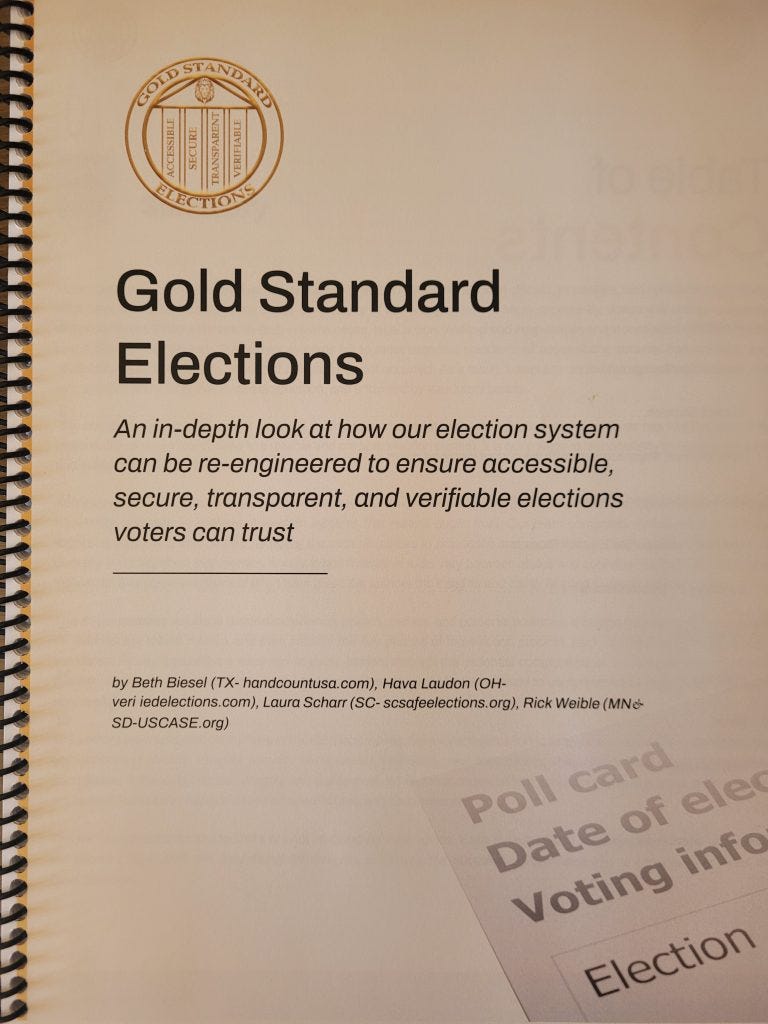Recommendations to save our elections
We must urgently make these changes to our election laws
Americans don’t trust our election system. This distrust has been growing since the HAVA Act was instituted in 2002. The HAVA Act subsidized the purchase of computerized electronic voting systems, with many components manufactured overseas. Today’s system is highly complex and vulnerable, making it hard for election workers and voters to understand. We must simplify by returning to a system of people, paper, and pens with some modern twists. The best way forward is to remove electronics from all four phases of the system—Voter Registration, Voter Validation, Marking and Counting of the ballots, and Reporting of the Results. While technology such as video recording of the counting is preferred, it is unnecessary. The Gold Standard achieves this by enhancing accessibility to qualified voters, security of the physical ballots, vote transparency, and results verifiability. The Gold Standard is a system “for the people by the people.”
In our whitepaper, we provide recommendations to improve all four areas of the election system.
Each state must try to incorporate these into its election laws. We recommend that Congress abolish all federal election laws like HAVA (the Help Amerca Vote Act), NVRA (National Voter Registration Act), and UOCAVA (Uniformed Overseas Citizens Absentee Voting Act)
Here is the QR code for more details.
Here is a summary of the recommendations
Phase 1: Voter Registration: controls who and how many ballots are issued
In-person registration with valid ID and proof of citizenship at least every 4 years (affidavit and confirmation of legitimate domicile)
Paper “library card” system of voter rolls sorted by precinct at the county with redundant read-only computer copy
Separate database for active and inactive/archived
Voter rolls free of charge, downloadable online-Active, inactive, archived
Phase 2: Voter Validation: controls the legitimacy of ballots eligible for tabulation
Ongoing validation of rolls; if the voter is activated after inactive status, they must re-register.
Paper Poll Books- confirm accuracy against paper card system and freeze 30 days before an election-no new registrations beyond this point
Voter must have a valid current ID at the time of voting
Periodic checks of voter qualifications and status to ensure accuracy
Phase 3: Marking and Counting of Ballots: controls when/where/how the votes are counted
One day of voting, a state/federal holiday (early voting is discouraged)
Hand-marked, Hand-counted Paper Ballots
Ballots must employ security features and procedures
Secure transfer of ballots by LEO with detailed logs
Increase poll workers to ensure timely counting (before midnight)
Count where cast at the precincts which should be small, <1,500 electors; penalties for violations
Sequentially numbered but random (pick a card)
Observable by the public and live-streamed and/or recorded if possible
Strong chain of custody measures
Public access to chain of custody docs
Procedures for COC must be published and election workers trained
Absentee balloting-minimal and also sorted and counted at their precinct (secure transfer from county)
Do not open absentee ballots until counting commences
Sequential numbering used to track and reconcile prior to count
Disability provisions – ADA and curbside
Phase 4: Election Night Results Reporting: controls what results are ultimately reported and certified in a timely manner
Tally results are provided on summary totals sheets, which are then sealed and reported to the county and state and posted on the precinct door.
Ballot counting is open to the public and can be recorded with a cellphone camera mounted over the tally sheets, ballots, and total sheets
Vote results shall be provided to all citizens within 24 hours of the count, preferably posted on county websites.
All election records should be free of charge to citizens
Here is a related article:
https://joehoft.com/a-crisis-of-confidence-we-must-overhaul-elections-for-the-people/
You can listen to a summary of the recommendations in this vlog:
https://www.scsafeelections.org/updates/recommendations-to-attain-gold-standard-elections/






While it has been mentioned thousands of times but never acted on I get the feeling this year might be the time to actually address the issue; stopping the leap forward/fall back adjustments to our clocks. I think I saw a post on X by Congressman Massey; R-KY, claiming he will sponsor a bill and I think President-elect Trump has mentioned the subject too.
I mention this here because this issue strikes me as having the potential to kill several birds with one stone. Obviously on the time issue there are two groups of people wanting either Standard Time or Daylight Savings Time to be the one selected as the permanent setting. With such a stark selection I think it would be a great opportunity to have a national referendum on the issue.
If such an election took place it would offer an opportunity for the creation of a national voting system that could be the template for future elections. I don't know the possible complexities related to Constitutional and other legal barriers that might inhibit a national voting system, which would be operated by each state, but if no such barriers exist this seems to be a great opportunity to structure such a system so as to guarantee free and fair elections.